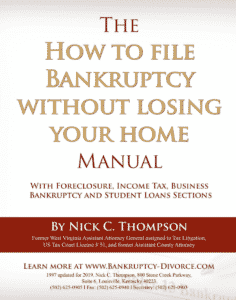The timing that goes into when to file bankruptcy is everything. That’s why you must educate yourself about bankruptcy time limits and filing periods. It hurts a lot less and is less stressful if you know what to do and when to do it.
Bankruptcy Time Limits and Filing Periods
Educating yourself to know what is happening is equally important. For instance, if you file too early, you might miss discharging certain debts like an income tax or student loan. Conversely, if you wait too long, the creditor has enough time to attach and sell a home, file a judgment lien, attach wages, or attach a bank account. Also, if you time what you do in your foreclosure properly, you might be in your home much longer than if you didn’t time things properly.
Next, it’s also important to know the time limits and filing periods between filing one case and the next case. The following is a list that shows the time you have to wait between one type of bankruptcy to the other:
| Type of Original Discharge: | Next Case is a: | Waiting Period: | Statute: |
| Chapter 7 discharge | Next Chapter 7 | 8 years | 11 usc 727 (8) |
| Chapter 7 discharge | Next Chapter 13 | 4 years | 11 usc 1328 f |
| Chapter 13, paying more than 70% | Next Chapter 7 | no waiting | |
| Chapter 13, paying less than 70% | Next Chapter 7 | 6 years | 11 usc 727 (9) |
| Chapter 13, discharge | Next Chapter 13 | 2 years | 11 usc 1328 f |
The process of filing for bankruptcy or fighting your foreclosure isn’t like ordering a pizza. Instead, you have to work together with your attorney to get the best results. With a pizza, you just order what you want the outcome to be. If it is rotten it is the store’s fault.
But with foreclosure or bankruptcy, you must work closely with your attorney to get the best results. So, I want to caution you to be wary of attorneys that don’t advise you of anything but then file the petition without the right information. Conversely, we prefer to plan what happens. Moreover, it isn’t illegal to take advantage of the law, the exemptions, and to time your bankruptcy properly.
Why is it Important to File Bankruptcy Sooner than Later?

The answer is timing! When you wait too long to consult with a lawyer, you lose the time to plan how to file bankruptcy. You might miss out on keeping the maximum amount of property, paying the least back in Chapter 13, or you may lose a foreclosure case.
Unfortunately, the banks don’t tell about the time limits and filing periods. Instead, they tell you what they want you to know and what they want you to do. In fact, they disseminate bad advice on purpose. For instance, they might advise you that it isn’t possible for you to file bankruptcy when it is. Additionally, they often pretend that they intend to modify a mortgage while they process the foreclosure past the time you can file an answer or motion to stop the foreclosure.
Trust the Banks and Your Case might be Dead on Arrival at your Attorney’s Office
In fact, we have seen people empty their retirement or savings and still lose their homes. We have also seen clients commit suicide or go through a divorce when this didn’t have to happen. Avoid this by taking the 3-4 hours to read our book so that you understand the bankruptcy and foreclosure process. The book even has sections on how to manage or discharge taxes, student loans, business debt, and foreclosures. Kentucky and Southern Indiana clients can schedule a free appointment in our office.
Even if you think you have waited too long it is better to find out from your lawyer than from a police officer carrying your furniture to the curb. One of the things that are certain is that information can either save you or the lack of it can certainly hurt you.
Not knowing the time periods and what is happening just means that the collection will happen without your planning it or being able to defend yourself. Sort of like the squirrel crossing the road in front of the car just before that thump-thump sound.
Even if you don’t hire us, read the book to learn about the bankruptcy time limits, filing periods, and exemptions for how often you can file bankruptcy. It will tell you whether you should file bankruptcy at the start of your foreclosure case or the end of it. This manual explains how to stop the IRS collections just long enough to age the taxes long enough to discharge them in bankruptcy.
Resources for Bankruptcy
Where to Report Foreclosure Scams
Federal Trade Commission (FTC) for foreclosure scams.
Trustee Regions and Offices for foreclosure scams that involve bankruptcy
Other Related Information
Free Bankruptcy Resources from Nick Thompson
Student Loan Death and Disability Hardship
It doesn’t cost a cent to make the appointment or to download and read the manual. If you drop by the office we will even give you a copy and we will even throw in a cookie or coffee. Contact my office right away to start the conversation. Nick C. Thompson, Attorney: 502-625-0905



